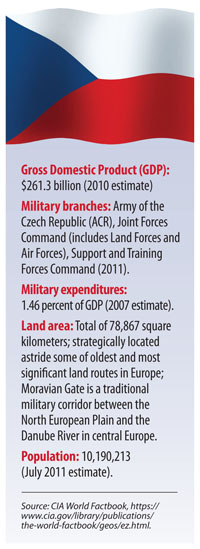Modest Opportunity Gives Czech Republic Big Potential
A security-conscious government is shopping for the right tools.
A market for the new generation of information technology tools is growing in the Czech Republic despite economic challenges taking place around the globe. Spending on security products is one area of growth, as the nation has followed the path of other countries worldwide to become more security conscious.
In 1993, the Czech Republic amicably separated from what is now Slovakia. Since that time, the Czech Republic has ridden to the heights of acceptance as a member of NATO in 2005 and to the depths of the economic downturn that began in 2008. Nevertheless, it has emerged as a moderately growing market for high-technology electronic systems.
According to a country profile by the U.S. Commerce Department’s U.S. Commercial Service Office in the U.S. Embassy, Prague, “The Czech Republic boasts one of the region’s most prosperous and industrialized economies. The country’s strategic location, well-developed infrastructure and skilled labor force attract strong flows of foreign direct investment.” A high demand exists for U.S. products and services, which are known for good quality and advanced technology. Economic growth measured 6 percent from 2005 to 2007, dropping to 4 percent in 2008. In 2009 and 2010, the Czech Republic continued to experience the impact of the global economic slowdown, with growth dropping to negative numbers. However, in 2011 the growth rose to an estimated 2.5 percent.
Manufacturing remains one of the biggest sectors of the Czech economy. The automotive industry is the largest single industry and, together with its suppliers, accounts for as much as 20 percent of Czech manufacturing. The Czech Republic produced more than one million cars for the first time in 2010—more than 80 percent of which were exported—according to the Central Intelligence Agency’s World Factbook.
Information provided by the U.S. Commercial Service Office indicates that the concern for security in the Czech Republic has translated into an expansion in the market for security products and services, with annual increases of between 9 to 11 percent projected over the next several years.
The growing market for security equipment involves both electronic and non-electronic products, according to the Commercial Service, which is tasked with assisting U.S. companies seeking to do business with the Czech government. That security equipment list breaks down according to need.
As a member of NATO, the Czech Army is expected to meet NATO requirements. As such, it is always in the market for new equipment, primarily in the area of tools that provide faster and more flexible response to security threats.
Police require facial recognition software and equipment needed to check airport passengers, as well as equipment to inspect trucks and other vehicles for illegal immigrants and contraband and to verify travel documents at border crossings.
 |
Finally, Czech government agencies are considering modernizing and enhancing their own building security needs at the behest of the European Union, of which the Czech Republic is a member.
In its analysis, the Commercial Service cites two major drivers in the expansion of the security marketplace in the Czech Republic. One driver is the growing concern both in the public and private sector for potential security threats. The second driver is the purchasing strength of Czech consumers. This situation is tied in part to the strengthened Czech crown compared to the U.S. dollar. This difference appears to be making consumers more willing to approve spending for security needs.
The estimated $2.4 million market for security products is only partially satisfied by Czech-based companies, with more than $1.8 million imported from the United States alone in fiscal year 2011, according to the Czech Statistical Office.
Germany is the Czech Republic’s largest trading partner, followed by the Netherlands and the United States.
The Commercial Service Office website offers guidance for companies that want to do business in the Czech Republic: “The Czech Republic is geographically small, with a population of 10.3 million, and most decision makers are concentrated in the capital city of Prague. The country has a well-developed European-style distribution system and a strong network of professional sales agents and distributors. It is a market where good personal relationships are crucial, and everyone seems to know everyone else. U.S. firms should concentrate first on building a close network of contacts and relationships. This requires face-to-face meetings with the goal of finding and supporting a Czech partner, agent or distributor.”
U.S. exporters are required to have an International Import Certificate from an importer to obtain an export permit from the Commerce Department. At times, the U.S. State Department may approve and issue the export license. Most security products require government licenses issued by the Czech Ministry of Industry and Trade. Czech firms that bring civil security products into the country must apply for import licenses and also must show a valid business contract with the foreign exporter. A list of products affected by this rule can be found in both English and Czech at www.aspi.cz.
The list of U.S. companies currently doing business in the Czech Republic includes: Honeywell; Dillon Precision Products Incorporated; EuroIntelliTech; Insight Technology Incorporated; Lasermax Incorporated; Sirchie Finger Print Laboratories Incorporated; Sturm, Ruger and Company Incorporated; Evans and Sutherland; and Fidelity Technologies.
Czech companies predominant in the sector include AXL Electronics; Hi Software Development Limited; Security Brno; Autovacs Bohemia; Aproks Limited; Carloc; Jabltron; PCS Cambridge Trading Company a.s.; and EVPU. Local manufactures are RETIA a.s.; INDET Safety Systems Vsetin a.s.; XENA Praha s.r.o; ELDIS Limited; B.I.T. Technik; B.O.I.S. Klika-BP; and Tesla.
In April 2010, the Organization for Economic Cooperation and Development (OECD) issued its most recent Czech Republic Economic Survey. In a speech in Prague marking the release of the report, OECD Secretary-General Angel Gurría noted that the country did a good job weathering the 2008 to 2009 economic crisis, remarking, “With reasonable external and fiscal balances, and a flexible exchange rate—linked to solid fundamentals, low inflation, sound banks and an absence of domestic financial bubbles—the country did not look particularly vulnerable to the international financial turbulence.”
Gurría did take note of the need for the Czech Republic to rein in government spending, saying, “The experience of other OECD countries shows that fiscal consolidation is much more likely to be sustained if it is based on structural reductions in public expenditure. Consolidation efforts based on expenditure restraint are also consistently associated with better growth performance. Consolidation plans for 2011 and beyond should therefore give greater weight to controlling expenditure.”
Similar to many developed countries, the Czech Republic also has to prepare to deal with the rising cost of health care and an aging population, Gurría says. And, he also calls for the Czech government to help promote the nation’s business prospects through regulatory reform policies.
WEB RESOURCES
Czech Republic Business Information homepage: www.czech.cz/en/business
Army of the Czech Republic fact page: www.czech.cz/en/66305-army-of-the-czech-republic
U.S. Commercial Service at the American Embassy in the Czech Republic: http://export.gov/czechrepublic
Association of Technical Security (Grémium Alarm): www.gremiumalarm.cz
Association of Private Security Services of the Czech Republic: www.asbs.cz
Czech Certification Office: www.unmz.cz/office/en



Comments